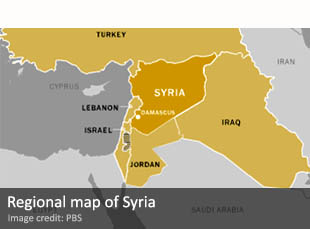Analysis: How al-Qaeda changed the Syrian Civil War
January 10, 2014 Leave a comment
 By IAN ALLEN | intelNews.org
By IAN ALLEN | intelNews.org
Until relatively recently, few observers believed that the government of Bashar al-Assad had a future in war-torn Syria. But the situation in the world’s most active battle zone has changed drastically in recent months, and now many suggest that the Assad forces are dominating the conflict. In a recent article in The New York Review of Books, Sarah Birke, a Middle East correspondent for The Economist, argues that it was the presence of al-Qaeda that changed the balance of power between the warring sides. She points the finger at the Islamic State of Iraq and Greater Syria, or ISIS, an al-Qaeda-linked group that made its appearance in Syria in April of last year. Since that time, ISIS has turned into “one of the most powerful forces on the ground”, with 7,000 well-armed fighters, many of whom are battle-hardened foreign Islamists. The origins of ISIS are in Iraq, where it was founded in 2003 as a Sunni armed paramilitary force, in response to the invasion by the United States. In 2004, the group pledged allegiance to al-Qaeda and Osama bin Laden, and changed its name to Al-Qaeda in Iraq (AQI). The United States government has pledged $10 million in return for information leading to the capture of the group’s leader, Abu Bakr al-Baghdadi, but with no success so far. In the spring of 2003, the Iraqi-born al-Baghdadi announced the merger of AQI with the Al-Nusra Front, AQI’s branch in Syria. Since that time, the two unified groups have been commonly referred to as the Islamic State of Iraq and al-Sham —al-Sham being a reference to ‘greater Syria’, known also as ‘the Levant’. Birke reports that ISIS now dominates Syria’s northwest, having established outposts in a series of “strategic towns” in the region, which are referred to by its leaders as “mini emirates”. Through these outposts, ISIS fighters are able to monitor border traffic between Syria and Turkey, and effectively control most border passages. This has crippled the Free Syrian Army, which used to dominate the Syrian opposition with the help of generous donations of money and war material coming in from Turkey. Last month, Washington and London announced the suspension of assistance to rebel groups in Syria, after it became clear that northern supply bases had been taken over by ISIS. The rising power of ISIS in northern Syria has even led the administration of US President Barack Obama to consider forging closer ties with other hardline Islamist groups in the country, as a means of challenging ISIS’ tactical dominance. Frightened by the prospect of an ISIS-dominated de-facto emirate in northern Syria, some American observers are now suggesting that the US should begin to “reengage with the Assad regime”. Meanwhile, the Free Syrian Army is now effectively being forced to fight on two fronts, against Assad and against ISIS, while most rebels are preparing “for a second war, against ISIS”. The only question on their minds is whether to fight it now, or after Assad goes, says Birke.






